Jim Mather

Farmer Jim Mather takes great pride in “growing fantastic animals” on his farm near Foxton - but he was still surprised to find a ham from one of his pigs had won the highly coveted Supreme title in the 2022 100% New Zealand Bacon and Ham Awards.
“We know it’s fantastic pork - because our pigs want for nothing,” says Jim.
“But you don’t usually get a lot of validation for your product as a farmer. We really appreciate that the winner made a point of making sure we knew it was one of ours - we’re absolutely delighted.”
Jim and wife Katie, along with Jim’s parents Rob and Karen, farm sheep, beef cattle and pigs over 320 hectares. They produce over 9000 pigs for market each year. The winner came from a pig processed by Cabernet Foods in Carterton and then sold on to Westmere Butchery in Auckland, which prepared the bone in leg ham that took the top title.
Judges said the Westmere ham was a stand-out entrant, describing it as “insanely delicious”.
Fourth generation farmer Jim has worked with pigs all his life. His father started a small piggery in Longburn in the 1970s before establishing a larger operation when he moved to their current Castle Glen Farms location.
“I was born in 1980 and on the same day I was born, a sow farrowed for the first time on the farm,” he says.
“When I was a baby, Mum would take me to the piggery and put me in a box with my toys, under one of the heat lamps we use to keep the piglets nice and warm. I’d be happy as anything, playing, while she helped Dad with his work.”
The pigs are farmed indoors in temperature-controlled facilities to ensure the most comfortable living conditions.
“Our philosophy for our pigs is that they never want for anything,” says Jim.
“They always have ample food, water, comfortable conditions and optimum temperatures.
"We don’t skimp on anything. That’s to the detriment of the bank balance sometimes - we get through 1900 tons of high-quality grain every year - but happy pigs, who are never stressed, are the key to really good pork. You come in here at any time of the day and you’ll find them just eating or chilling - pigs like to sleep a lot.”
Jim says he enjoys the character and personality of pigs, which makes them a pleasure to work with.
There are currently 340 sows on farm, all sourced from the world-leading Pig Improvement Company (PIC). Jim’s passion for the quality of his product is evident as he talks about “exciting developments on the horizon as PIC has a new Duroc pig breed, which produces exceptionally succulent and delicious pork”.
He’s also enthusiastic about the increasing choice for consumers around how their 100 per cent New Zealand born and raised pork is prepared.
“In the past, it has mostly been about chops and roasts required by the consumer, but now the choice of cuts are increasing which is nice to see . We supply to Cabernet Foods and they are doing good things with different cuts which is exciting for us as a producer and great for promoting the pork industry.”
“There’s a butcher in Levin doing Spanish style porchetta with macadamia stuffing with our pork. No part of the pigs get wasted nowadays and every part is delicious.”
Jim’s personal favourite pork cut is a stuffed shoulder but he’s also partial to barbecued pork.
“We have supplied barbecue restaurants in Auckland and they loved it.”
Jim employs five full time staff and says they are critical to the comfort and welfare of the pigs and the quality of the pork.
“They are so hard-working and dedicated to the welfare of the animals, we have a great team who are very skilled and experienced at what they do. Winning the Supreme Title is a real feather in their caps, an accolade for them.”
Stanley Family

Continuing a proud family tradition of producing fine pork
When Karl Stanley’s grandfather and great uncle returned from World War Two, they were proud to purchase one of the farmland blocks set aside for returning soldiers. Today, Karl is proudly upholding those values, farming high quality pork on the land, nestled on the famous Surf highway near Opunake in Taranaki.
Karl’s grandfather – former All Blacks manager Noel Stanley – and his brother Ron originally set up a small piggery to feed pigs the whey from their dairy herd – but eventually the piggery took over entirely.
“We love working with our pigs, they are just such interesting and rewarding animals to be around,” says Karl. “We believe happy pigs with high standards of health and welfare and very good nutrition are the key to producing outstanding pork. Our pigs are fed entirely on wheat, barley and corn and the result is a consistently high quality product.”
Karl’s personal favourite cut is a rack of pork, closely followed by belly of pork.
“I do love a really good pork roast with a bit of crackling on the side. That really is pretty hard to beat.”
Holly Sterne

Patoa Farms may not be a familiar name to many Kiwis, but many will have enjoyed the pork from this family-owned farm in North Canterbury.
More than 20 years ago, Steve Sterne, Jens Ravn and their families joined forces with a vision to farm pigs outdoors. The farm on the south bank of the stunning Hurunui River is now run by Steve and his daughter Holly.
The focus at Patoa Farms, now New Zealand’s largest pig farm, is to create a circular economy of inputs and outputs, in terms of the cycle of nutrients through its eco-system – all supported by the latest technology.
The farm has its own weather station and centre pivot irrigation and moisture probes are used for planning irrigation.
The free-farming system, which sees the farm produce about 100,000 pigs a year, allows for all the manure and used straw to be recycled and reused in the most effective ways.
Soiled straw for composting goes back to the company that provides the straw -- in the same trucks the fresh load has been delivered in. Composted manure is also sold to other farmers or used on cropping land.
Holly firmly believes that while 80 per cent of pork quality can be attributed to genetics, high quality feed, care and good stockmanship is critical.
“Good stockmanship and good welfare all through the life of the pigs is a significant factor in the quality of the product. Calm happy pigs in a good environment cared for by understanding staff is so important to us at Patoa Farms.
The farm employs 55 people – contributing around $2 million in wages to the local economy and is an approved provider of the Primary ITO New Zealand Certificate in Pork Production qualification for levels 3 and 4.
“We can offer that on farm due to our economy of scale,” says Holly. “It means staff don’t have to go off site to do block courses and it makes it much easier for them to work around families, children and other commitments."
“Our pride is not just in our product but in our organisation as a whole. What we do is so much about bringing a whole variety of people together who produce something very special."
Sean Molloy

The ‘pig hotel’ where midnight snacks are on the menu
“I like to think of our farm as ‘hotel-style’ accommodation for pigs,” says farmer Sean Molloy.
The views around the Molloy’s Offaly Farms would be very well suited to a hotel. The piggery in the rural town of Sheffield has been in the family for over 40 years.
“Pigs are just very enjoyable animals to work with,” says Sean. “Our facilities here enable the pigs to do what they naturally do in the best possible conditions for their health and wellbeing.
“I really enjoy the technology side because it helps you to look after the pigs so much better. Our buildings are very well insulated, which works to keep the pigs cool in summer and warm in winter. They live in a temperature-controlled environment with ventilation to keep the air fresh, in the same way we live in our own homes.
“Pigs are also quite dusty so we have installed a misting system that releases a fine spray for 30 seconds every 10 minutes. That grabs all the dust in the air and drops it to the floor to drain away and can be used for further cooling in summer."
Sean says a major advance has been electronic feeding systems.
“When a sow feels like eating, she will go to a feeding box, she walks in and the door closes behind her, so she can feed alone without competition. The system reads her tag and knows exactly how much feed she needs. It then opens the trough and drops feed in until she has had her daily amount."
“We monitor it very closely, and if we notice a sow isn’t eating all their food, then we check them right away. Often it might be because they are feeling under the weather."
“It’s also very natural because it means each pig can feed when they feel like it. They are very much creatures of habit and you find they tend to eat around the same times each day – and some even like to feed in the middle of the night.”
Sean is partial to a nice pork ribeye and says the happier the pigs the better the flavour and texture.
“What is good for the animals is good for the farm. The better you look after your animals, the more profitable you will be. Keeping piglets safe and getting them off to the best possible start is so important. That comes down to good feeding and good facilities that allow the pigs to do what they naturally do.”
Jason Palmer

“I think every pig farmer would say the best part of it is working with the pigs, because they are such enjoyable animals to be around,” says Jason Palmer, who looks after 500 sows at Dunsandel, Canterbury.
“I’ve worked with pigs for a long time. My father had a 100-sow outdoor herd and my uncle kept pigs too. The technology has advanced significantly since then, providing better efficiencies and improved individual care of each pig.”
For Jason, that technology includes a computerised feeding system.
“That provides a means of communication with the sow and we can manage the feed precisely to each animal’s requirement and change it as their dietary needs change.
“We mill all our own feed here too, using local wheat and barley, which is supplemented with soya meal, vitamins and minerals. We have eight different diets, which are distributed automatically to different locations around the piggery.”
A range of heating and ventilation systems are also used to meet the needs of different ages of pigs.
All effluent from the piggery is pumped to a holding pond and then spread on to the surrounding dairy farm to utilise the nutrients for growing high quality pasture.
“Genetics and feed are a big part of producing quality pork,” says Jason.
“The rest of it is diet, providing optimal conditions and minimising stress – contented pigs produce better quality meat and are more productive. We choose to house our pigs indoors because it suits the land we are on but it also allows us to provide the best care for them, with automated temperature control and protection from the weather.”
There is a four-strong stockperson team in the piggery and all have been trained to work with pigs in ways that minimise stress on the stockperson and the animal.
Jason’s very proud of the end product – “I’m pretty partial to sweet and sour pork”.
Nicky Tily

Nicky grew up in urban Christchurch and worked in the food service sector for a number of years – but today, she’s a junior stockperson working with up to 4,000 pigs – and she loves every minute of it.
“Pigs are so intelligent,” says Nicky, who is 23. “I enjoy everything about the job.”
Nicky had always liked the idea of working with animals or on a farm and considered a career in vet nursing. However, having completed a six month course, gaining a National Certificate in Animal Husbandry, she decided to go in a different direction.
Her first job in the farming sector was with Mapua stud at Southbridge, which includes a sheep stud, dairy grazing, cropping and a 120 sow outdoor piggery. She enjoyed all of the work, but particularly working with the pigs.
In July, she moved to Offaly Farms at Annat, near Sheffield.
“All my learning in farming has been on the job although I’m now pursuing Primary ITO Level 3 qualifications around pigs,” says Nicky. “It’s been a steep learning curve but I have really enjoyed it. I’ve learned about health and safety, driving the vehicles, how to do artificial insemination (AI), use the feed mill, give pigs vaccines and carry out health checks.”
“There is a lot of automation at Offaly Farms. Rather than adding all the components of a diet recipe manually into the mixer, I’ll make a small bucket of minerals first, than the grains, oils, and other necessary things are added automatically into the mixer. A big focus for me is the health of the pigs.”
A big part of her enjoyment of the role is the personalities of pigs and being part of ensuring they are happy and well cared for.
“Most people never get to talk to a pig farmer because there aren’t that many of them and they are off the beaten track. But you should see how happy and chilled the pigs are in their big temperature-controlled rooms. A lot of the time they are just lying around relaxing. Sometimes I’ll go in to check if one hasn’t been to feed and it’s because she is so relaxed. They don’t mind a belly rub or a scratch now and then. I love playing with the piglets too.”
Nicky also really enjoys the environmental aspects of working on farm.
“We have an amazing covered effluent pond and all the effluent is used elsewhere on the farm – we spread it on the paddocks. We also have a very efficient composting system. The system is all natural and only uses saw dust to compost the pigs."
Nicky says getting involved with Young Farmers helped her to make the move from city work to a rural career. Joining her local Waimakariri Young Farmers, she has become the Treasurer and even won member of the year.
“I didn’t want to keep working in the city, so I looked for jobs I could apply for in farming. I’d definitely like to stay working with pigs. It would be good to move into management eventually.”
Bryan Tucker

Bryan Tucker’s Ngarara farm in the Wairarapa epitomises the New Zealand pork sector’s strong commitment to the environment.
Minimising livestock and feed transport, using pig effluent as a fertiliser source and extensive native planting are just some of Bryan’s approaches to good environmental management on the farm near Greytown.
Almost half the 1,300 tonnes of barley used to feed the pigs each year is grown on the farm. The pigs are raised on bedding, which is composted as an additional source of nutrients that is applied to surrounding paddocks. Pig effluent goes into a slurry pond to be turned into fertiliser – mixed with urea - for the farm’s dairy operation with 1,000 Friesian, Jersey and Kiwi-cross cows.
Bryan, who is the third generation of his family to farm the land, says good environmental management combined with good genetics, high quality feed and excellent stock management is the key to successful pig farming.
“That leads to contented pigs and quality pork for New Zealanders.”
The New Zealand pork sector has a low environmental impact compared to other forms of livestock production. The sector currently contributes just 0.2 per cent of New Zealand’s total agricultural greenhouse gas emissions and pigs produce much less methane than ruminant animals like cattle or sheep.
The fertiliser spreading system was devised by Bryan, with pig effluent making up about half of the fertiliser used on farm. He believes it provides a more balanced fertiliser than straight urea.
“We give the effluent pond a real good stir in autumn and spread that using irrigators with pivots. Mixed with urea, it’s brilliant fertiliser. Sludge from the pond is also removed every year and spread using a slurry tanker.”
The planting programme on the farm began in the early 2000s, and in 2003 Ngarara won the Dairy Farm Award in the Greater Wellington/Wairarapa Farm Environment Awards. The extensive native planting has included, among others, manuka and kanuka, olearia and totara. Space is also leased out to beekeepers, so there are a lot of hives on the land.
Bryan’s son-in-law Gary Healy has managed the piggery, a farrow to finish operation, for many years. It is home to around 2,500 pigs at any one time, comprising 245 sows and the rest being growing pigs.
The growers live in eco shelters and sows are kept in social groups of six until a week before farrowing, when they go into the modern maternity unit to give birth and until their piglets are weaned. The sows give birth twice a year and stay in the maternity unit for up to four weeks after farrowing. They live in groups when not in the maternity unit.
“There is currently no better system available than the farrowing crates,” says Bryan.
“We waterblast and disinfect their ‘rooms’ for them and when we open up the gates, they literally run along the races to get to the crates because they know they are going to have their piglets there and they’re warm and happy and well fed. The system also protects the piglets. Everyone comments how contented and healthy they are.”
The piglets are weaned from the sows at between 3-4 weeks of age and placed into straw based eco shelters for 6-7 weeks. They are then shifted into purpose-built buildings and fed a liquid feed barley-based diet until ready for market.
“We have a nutritionist who comes in to advise us. Our focus is on caring for them in way that is best for them.”
Find your local butcher
Company
Products
Awards
Bacon, Ham, Pork
Woolworths Free Farmed Champagne Ham Shaved - Bronze winner 2025
Woolworths Free Farmed NZ Boneless Champagne Half Ham - Bronze winner 2025
Woolworths Free Farmed NZ Half Ham - Bronze winner 2025

Bacon

Cnr. Broadway Ave and Albert Street
Palmerston North
newworld.co.nz/lower-north-island/manawatu-and-wairarapa/melodys
Bacon, Ham, Pork
Manuka Honey & Jamaican Style Jerk Glaze Bacon - Silver winner 2025
Sweet Chilli Chipotle Bacon - Bronze winner 2025

Bacon, Ham, Pork
Meat Matas Leg Ham - Silver winner 2025
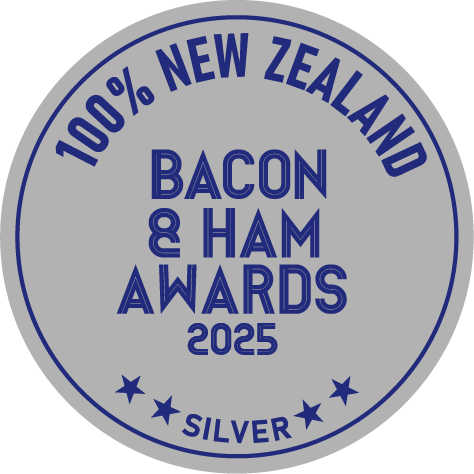
Bacon, Ham
Streaky Bacon - Bronze winner 2025

Bacon, Ham
Honey Cured and Manuka Smoked Ham - Bronze winner 2025

Bacon, Pork
NZ Pork Butt Bacon - Category Champion 2025
NZ Dry Cure Streaky Bacon - Gold winner 2025

Bacon, Ham, Pork
Rib Rocker Dry Cured Loin Bacon - Gold winner 2025
Dry Cured Loin Bacon - Bronze winner 2025

Shop 12
The Richmond Centre
Cnr Egmont & St Aubyn Streets
New Plymouth
Bacon, Ham, Pork

Bacon, Ham, Pork

Pork, Ham, Bacon

Bacon, Ham, Pork

Bacon, Ham, Pork
Expleo Dry Cured Streaky Bacon - Bronze winner 2025

Bacon, Ham, Pork

Available at selected supermarkets and stores across the North Island - check their Facebook page for the full list of stockists
facebook.com/p/Pirongia-Bacon-100057859741331/
Bacon
Pirongia Streaky Bacon - Silver winner 2025

Bacon, Pork
Gypsy Bacon - Gold winner 2025
Maple Middle Bacon - Silver winner 2025

4 Crofton Rd,
Ngaio
3 Geange St,
Upper Hutt
829 High Street,
Avalon
30 Dundas Street,
Seatoun
Bacon, Ham, Pork
Manuka Smoked Shoulder Bacon - Gold winner 2025
Honey Cured Ham - Gold winner 2025
Manuka Smoked Ham - Gold winner 2025
Honey Cured and Manuka Smoked Ham - Silver winner 2025

Bacon, Ham, Pork

Bacon, Ham, Pork

Bacon, Ham
Old School Pressed Ham - Category Champion/Supreme Ham Award 2025
Bushmans Streaky Bacon - Gold winner 2025
Old School Streaky Bacon - Gold winner 2025
Bushmans Bacon - Silver winner 2025
Old School Middle Bacon - Bronze winner 2025

Bacon, Ham, Pork
KFM American Streaky Bacon - Catergory Champion winner 2025
KFM American Dry Cure Streaky Bacon - Bronze winner 2025

70 Tiki Road,
Coromandel
Bacon, Ham

Bacon, Ham, Pork
Guanciale - Category Champion winner 2025
Green Middle Bacon - Gold winner 2025
Honey Cured, Manuka Smoked Shoulder Bacon - Gold winner 2025
Honey Cured, Manuka Smoked Middle Eye Bacon - Silver winner 2025
Dry Cured Streaky Bacon - Silver winner 2025
Italian Streaky Bacon - Silver winner 2025

Bacon, Ham, Pork

Bacon, Ham
Swiss Deli Dry Cured Smoked Bacon - Category Champion 2025
Swiss Deli Continental Spec Whole Bacon - Gold winner 2025
Swiss Deli Sliced Champagne Ham - Gold winner 2025
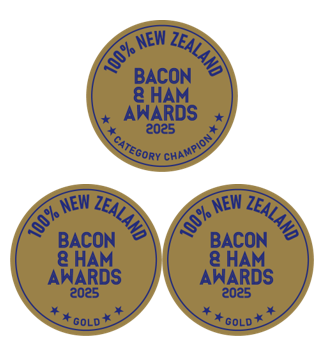
Bacon, Ham, Pork
Traditional Shoulder Bacon - Silver winner 2025
Dry Cured Streaky Bacon - Bronze winner 2025

Bacon, Ham, Pork
Mapari Free Range Streaky Bacon - Silver winner 2025
Mapari Free Range Ham - Silver winner 2025
Mapari Free Range Champagne Ham - Bronze winner 2025
Mapari Free Range Classic Bacon - Bronze winner 2025
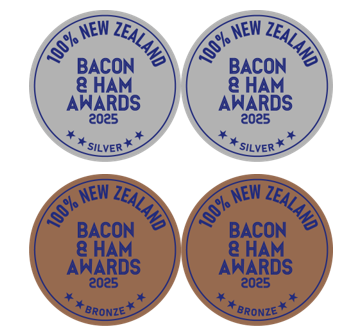
Bacon, Pork

Bacon, Ham, Pork
Dried Cured Middle Eye Bacon - Silver winner 2025
Dried Cured Shoulder Bacon - Bronze winner 2025

Bacon, Ham, Pork

Bacon, Ham

Bacon
Speck Bacon - Gold winner 2025
Deda's Picante Bacon - Silver winner 2025

Bacon, Ham, Pork
Dry Cured Middle Eye Bacon - Silver winner 2025
Nitrate Free Streaky Bacon - Silver winner 2025
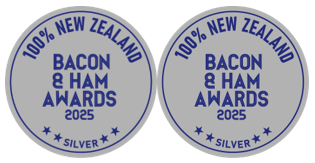
Bacon, Ham, Pork
Dry Cured Streaky Bacon - Gold winner 2025
Farmgate Heritage Ham - Bronze winner 2025

Bacon, Ham, Pork
Middle Bacon - Gold winner 2025
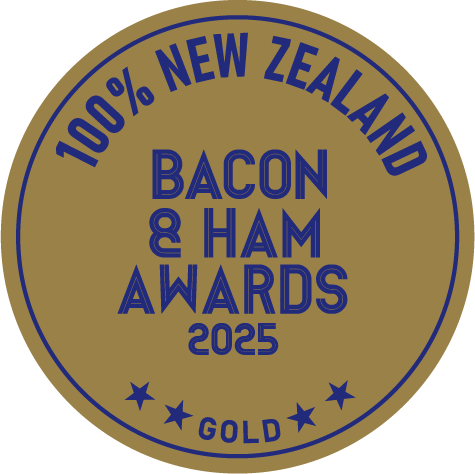
Bacon, Ham, Pork

Bacon, Ham, Pork
Honey Chilli Bacon - Gold winner 2025
Pork Pastrami - Silver winner 2025

Bacon, Pork
Free Farmed Loin Bacon - Gold winner 2025

4 Joll Road,
Havelock North
Bacon, Ham, Pork

26 Wanganui Flat Road,
Hari Hari,
West Coast
Bacon
Danish Back Bacon - Bronze winner 2025

Woolworths
Ham
Farmland NZ COB Ham Half - Gold winner 2025

Bacon, Ham
Champagne Ham - Category Champion 2025
Middle Bacon - Category Champion 2025
Middle Eye Bacon - Category Champion 2025

Bacon, Ham, Pork
2025 Winner - People's Choice Bacon
2025 Winner - People's Choice Ham

Bacon, Ham, Pork

237 Maunganui Road,
Mount Maunganui,
Tauranga
Bacon, Ham, Pork

Bacon, Ham, Pork

Bacon, Ham, Pork

Bacon, Ham, Pork
Authentic Dry Cured Middle Eye - Category Champion 2025
Dry Cured Streaky, BBQ Bourbon Bacon - Gold winner 2025
Dry Cured Streaky, with Egmont Honey - Silver winner 2025
Traditional Middle Eye Bacon - Silver winner 2025
Traditional Middle Bacon - Bronze winner 2025
Dry Cured Streaky, Candied Orange Glaze Bacon - Bronze winner 2025

Bacon, Ham, Pork
Reuben's Dry Cured Middle Eye Bacon - Gold winner 2025
Reuben's COB Ham - Gold winner 2025
Reuben's Boneless Loin Ham - Gold winner 2025
Reuben's Middle Free Range Bacon - Silver winner 2025
Reuben's Traditional Streaky Bacon - Silver winner 2025
Reuben's Boneless Ham - Bronze winner 2025

17 Queen Street
Wainuiomata
Bacon, Ham, Pork

Bone in Ham - Gold winner 2025

121 Codelia Street
Stratford
Bacon, Ham, Pork

23 Ocean View Road
Hillcrest
Bacon, Ham, Pork

Bacon, Ham, Pork
Naturally Maple Streaky Bacon - Category Champion/Supreme Bacon Award 2025
Bone in Ham - Gold winner 2025

239A Queen St
Auckland City
Pork

167 Puhinui Rd,
Papatoetoe
Auckland
Pork

61 Belmont Road
Paeroa
Bacon, Ham, Pork
Manuka Smoked Loin Bacon - Silver winner 2025
Manuka Smoked Streaky Bacon - Bronze winner 2025

Bacon, Ham, Pork

Bacon, Ham, Pork







